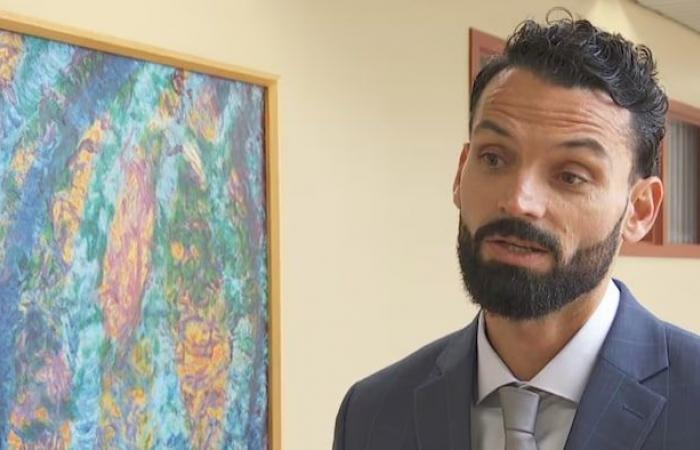The reporting of cryptocurrency fraud have become common for Ottawa police. The agents receive daily testimonies from people who say they have been cheated.
The largest scam to date in the federal capital is $ 2 million, says Ottawa Police Service (SPO).
In the country, Canadians have lost more than $ 94 million due to cryptocurrency fraud, between January 1 and September 30, 2024, according to the Antifraude Center in Canada. An estimated loss at nearly $ 23 million just for Ontarians.
But the extent of the phenomenon is difficult to assess locally, because the cases are still too little reported and then represent only a fraction of the fraud committed in the territory, underlines the acting sergeant, Alex Wolf, detective to the unit of organized fraud. The latter specifies that when the victims realize that they have been scammed, they often feel shame.
Open in full screen
The acting sergeant, Alex Wolf, detective in the organized fraud unit, SPO.
Photo : - / Chris Black
Typical profile of targeted people
If the victims generally come from different environments, fraudsters seem to target a particular person’s profile, notes Sergeant Wolf.
[On va cibler] people who have arrived at a time of their lives when they have more income
notes the detective. What we see is that people in their forties, fifties and sixties constitute the dominant cohort of our community victim of fraud to cryptocurrencies
.
The larger the wallet, the greater the risk of fraud, said the police.
The SPO Stresses that you have to be wary of a scenario that promises easy money, and that once the money sent, it often becomes impossible to recover it.
To read and listen too:
The mode of operation Crypto fraudsters
Fraudsters generally use a hypertrucited video featuring known personalities like Donald Trump, Elon Musk or Doug Ford, who are shining large yields by investing in a cryptocurrency platform.
As convincing as they may be, hypertruked videos are designed by artificial intelligence, the police warn.
The investor believing that making a good deal transfers funds according to the instructions, and observes his investment growing quickly. But it is only an illusion because, in reality, the money goes into the bags of crooks, that the police describe as professionals.
The difficulty for a local police service is that this type of criminal activity requires software, specialized training, a certain level of interest and understanding of the subject
said the detective specializing in fraud, Alex Wolf.
Money circulates at lightning speed and fraudsters can be anywhere.
Often, the victims will not see the scam before the week following the initial transfer.
The SPO maintains that in some cases, affected people then turn to recovery agencies which, too, can prove to be fraudulent, before contacting the police.
But it is often too late, money is probably already in the hands offoreign actors
said Alex Wolf.
[Les fraudeurs] Do not reside in Canada, they do not live in the United States or North America. We have to look abroad: in East Asia, West Africa, Eastern Europe
.
Open in full screen
The larger the wallet, the greater the risk of fraud, said the police. (Archives photo)
Photo : - / Sarah Rieger
According to the police, professional fraudsters in cryptocurrency pass with different platforms, different financial institutions, and hide behind false identities. They often find themselves in courts that do not always cooperate very well with local authorities.
The combination of these elements makes the task difficult from the start.
Investigators will prioritize the cryptocurrency fraud files according to the chances of conviction and the probabilities for the victim to recover his money.
According to Sergeant Gordie Jones, an cryptocurrency expert from the Royal Canadian Gendarmerie, fraud techniques and technology are evolving very quickly, an additional challenge for the police.
I could spend every minute of each day do research on cryptocurrencies without knowing everything about it. […] There is no way to follow
he admits.
With information from Shaamini Yogaretnam, CBC News







